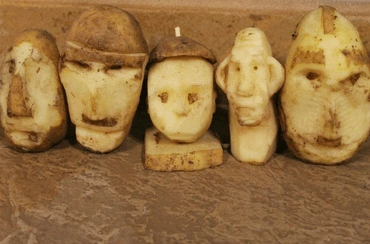1
Viešpats kalbėjo man:
2
“Žmogaus sūnau, kalbėk savo tautai: ‘Kai Aš atvesiu į kraštą kardą ir jo gyventojai bus išsirinkę iš savo tarpo sargybinį,
3
jeigu jis, artėjant kardui, pūs trimitą ir taip įspės tautą
4
ir jei kas nors nepaisys įspėjimo, girdėdamas trimito garsą, ir kardas sunaikins jį, tai jo kraujas bus ant jo paties galvos,
5
nes jis girdėjo trimitą, bet nepaisė. O kas paklausys įspėjimo, išgelbės savo gyvybę.
6
Bet jei sargybinis matys artėjantį kardą, bet nepūs trimito ir neįspės tautos, o kardas užmuš ką nors, tai jis bus užmuštas už savo kaltę, bet jo kraujo Aš pareikalausiu iš sargybinio rankų’.
7
Žmogaus sūnau, Aš paskyriau tave sargybiniu Izraeliui. Todėl tu girdėsi mano žodį ir įspėsi juos mano vardu.
8
Jei Aš sakysiu nedorėliui: ‘Nedorėli, tu mirsi!’, o tu jam nieko nesakysi ir neįspėsi dėl jo nedoro kelio, tai jis mirs dėl savo nusikaltimų, bet jo kraujo pareikalausiu iš tavo rankų.
9
Jei tu įspėsi nedorėlį dėl jo nusikaltimų, bet jis tavęs neklausys, jis mirs dėl savo nusikaltimų, o tu išgelbėsi savo sielą.
10
Žmogaus sūnau, sakyk Izraeliui: ‘Jūs sakote: ‘Jei mūsų kaltės ir nuodėmės yra ant mūsų ir mes nykstame dėl jų, tai kaip mes galime išlikti gyvi?’
11
Sakyk jiems: ‘Kaip Aš gyvas,sako Viešpats,Aš nenoriu nedorėlio mirties, bet noriu, kad nedorėlis atsiverstų, paliktų savo piktus kelius ir gyventų. Nusigręžkite nuo savo piktų kelių! Kodėl jūs turėtumėte mirti, Izraelio namai?’
12
Tu, žmogaus sūnau, sakyk savo žmonėms: ‘Teisiojo neišgelbės jo teisumas, jei jis nusikals. Ir nedorėlio nedorybė nesunaikins jo, jei jis nusigręš nuo savo nedorybės.
13
Jei Aš sakau teisiajam: ‘Tu tikrai būsi gyvas’, o jis, pasitikėdamas savo teisumu, nusikalsta, tai jo teisumas nebus prisimintas, ir jis mirs už savo nusikaltimą.
14
Jei Aš sakau nedorėliui: ‘Tu tikrai mirsi’, ir jis nusigręžia nuo savo nuodėmės bei daro, kas yra teisinga ir teisu:
15
grąžina užstatą, atiduoda, ką išplėšė, laikosi gyvenimo nuostatų ir nedaro neteisybės, jis bus gyvas ir nemirs.
16
Jo nuodėmės nebus jam įskaitytos, nes jis darė, kas yra teisinga ir teisu; jis tikrai bus gyvas’.
17
Tavo tauta sako: ‘Viešpaties kelias neteisingas’, tuo tarpu jų pačių kelias neteisingas.
18
Jei teisusis nusigręš nuo savo teisumo ir nusikals, jis mirs.
19
Jei nedorėlis nusigręš nuo savo nedorybės ir darys, kas yra teisinga ir teisu, jis gyvens.
20
Jūs sakote: ‘Viešpaties kelias neteisingas’. Izraeli, Aš teisiu tave pagal tavo kelius’ ”.
21
Dvyliktaisiais tremties metais, dešimto mėnesio penktą dieną, atėjo pas mane pabėgėlis iš Jeruzalės ir pasakė: “Miestas krito”.
22
Pabėgėliui dar neatėjus, vakare, Viešpats palietė mane. Jis atvėrė mano burną, ir aš nebebuvau nebylys.
23
Viešpats kalbėjo man:
24
“Žmogaus sūnau, Izraelio gyventojai, likę tarp griuvėsių, sako: ‘Abraomas, būdamas vienas vyras, paveldėjo kraštą. Mūsų yra daug, tad jis mums tikrai priklauso’.
25
Todėl sakyk jiems: ‘Taip sako Viešpats Dievas: ‘Jūs valgote mėsą su krauju, garbinate stabus ir praliejate kraują, argi jūs gyvensite krašte?
26
Jūs pasitikite kardu, darote bjaurystes, išniekinate savo artimo žmoną, argi jūs gyvensite krašte?’
27
Taip jiems sakyk: ‘Taip sako Viešpats Dievas: ‘Kaip Aš gyvas, gyvenantys namų griuvėsiuose, kris nuo kardo, esančius atvirame lauke draskys laukiniai žvėrys, o gyvenantys tvirtovėse ir olose bus maro sunaikinti.
28
Aš paversiu kraštą dykyne, jo išdidumui padarysiu galą. Izraelio kalnai bus taip ištuštėję, kad jais niekas nebekeliaus.
29
Kai kraštą paversiu visiška dykyne dėl jų nusikaltimų, tada jie žinos, kad aš esu Viešpats’.
30
Žmogaus sūnau, tavo tauta kalba apie tave tarpduriuose ir pasieniuose, sakydami vieni kitiems: ‘Eikime pasiklausyti Viešpaties žodžio’.
31
Jie ateina pas tave kaip tauta, sėdi tavo akivaizdoje, klausosi tavo žodžių, tačiau nevykdo. Jie kalba draugiškai, bet jų širdis yra klastinga.
32
Tu esi jiems dainininkas, turintis gražų balsą ir gerai skambinantis arfa. Jie klausosi tavo žodžių, tačiau nevykdo.
33
Bet kai tai išsipildyso tai tikrai išsipildys,tada jie žinos, kad tarp jų buvo pranašas”.







